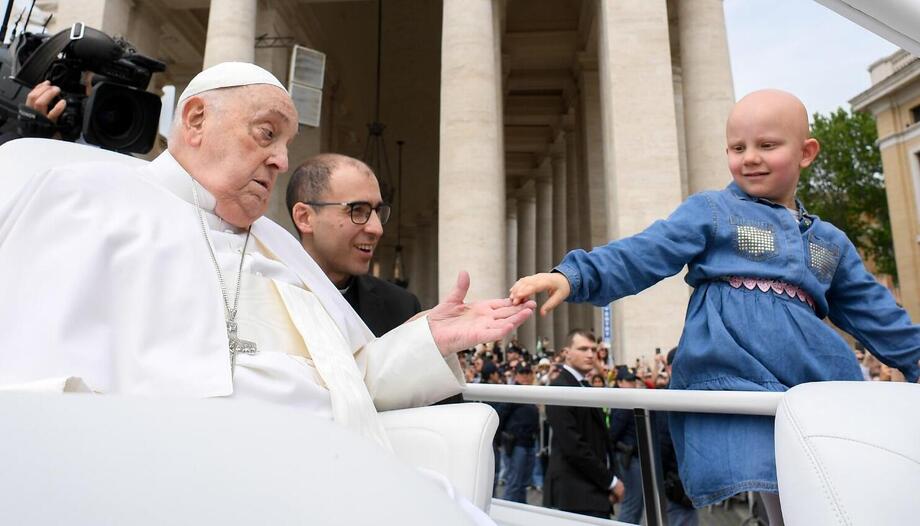I am moved as I review a video from my recent "close encounter"with the Pope FrancisWe call him Lolo Kiko in the Philippines. It was last January, during the Jubilee of Communicators.
He was wheeled down the central aisle of the Paul VI auditorium and people crowded around him.
A lady nearby was shouting words of thanks, so I joined her to express my gratitude. Next to me was a compatriot who kept repeating: "Mabuhay (Viva), Lolo Kiko!"
Thinking of something personal to say, I shouted: "We love you very much, Holy Father, great job!". It was a conviction I have always held, despite articles on various Catholic sites criticizing the Holy Father.
As a theologian, I try to base my thinking on current issues from the perspective of faith, which is basically God's point of view. Faith in all the teachings of Jesus and his Church, which includes faith in God who decided to speak and rule through a Pope.
From the outset, I expected Pope Francis to address the problems of the relativistic and secularized West as St. John Paul II -The Great One - tackled and brought down the totalitarian communist empire of Eastern Europe. And immediately, after hearing his first interview, my heart swelled with anticipation.
Pope Francis saw the Church and the world as a field hospital: so many wounded people, so much suffering. And what impressed me the most was his emphasis on the mercy. On the one hand, it is emblazoned on its own motto: Miserando atque eligendHe will be merciful and choosing, thus showing that mercy will permeate his entire pontificate.
More importantly, it has given it a solid theological foundation. Mercy is not just another feature of God. Mercy is God's central truth. Because it is central, this idea has operative implications for how we are to live our lives, for how the whole Church is to be organized.
After his death, I posted this on my Facebook page and, after thinking about it more, I realized that mercy really underlies all of his work:
"I loved Pope Francis and would like to hail all the great things he has done for us. I think these are his seven major accomplishments:
God is mercy: be merciful. It helped us to focus on God's innermost truth: Mercy. And so, if we want to be united to God, our only goal, we have to be merciful to the people around us, especially to sinners, the ignorant, the poor and all those in need.
2. Kergyma centralityGod loves us, he died for us, he is alive and close to us. This central truth of our life, he taught, is the center of all our efforts to renew our lives. Contemplating God who loves us infinitely in every moment moves us to love God and neighbor generously.
3. Primacy and infinite dignity of each person.. We will be truly capable of loving God - the Trinity of persons - and our neighbor if we value the infinite dignity of each person. Today's moral deviations - such as abortion, same-sex marriage, climate indifference, lack of compassion for sinners - are rooted in forgetting the infinite dignity of each person, each of whom we must serve.
4. Co-responsibility of all in the Church (Synodality). Since we are all other Christs, we are all Church. We are all co-responsible for orienting our journey towards God. This thrust of Francis unleashes all the energies of Catholics to move the Church forward.
5. Reform of Church governance for evangelization.n. Curia Reform and all the instruments of government so that all government is for evangelization. Since evangelization is the mission and life of the Church-the reason we exist-then the transmission of truth (doctrine) and the norms of Church governance (canon law) must be at the service of bringing people to Christ through the Gospel.
6. Joy of the Gospelof holiness and the family. The title of three of his key documents contained the idea of joy. Christian life revolves around joy. Living faithful to Christ's evangelizing work, to his call to be holy and to care for the family is the source of the greatest joy.
7. Bases for the peaceful coexistence of the Church with liberals, secularists, Muslims and other groups. Pope Francis has laid the groundwork for establishing concord with groups that have historically had relationship problems with the Church. Peacemaking is a basic role of any leader for his organization to thrive. What's more, liberals who are very influential, once very critical are now on the Pope's side."
From this post, you will understand why my last words to our dear Lolo Kiko were: Great job!
He understood God, whom he loved with all his heart and all his strength. And understanding God so deeply, he has left a legacy that will not last only until this year. Since mercy is God's central truth and God's nature is forever, this legacy is for all time. And we are fortunate - profoundly fortunate - to be his children in this new stage of the Church - a stage of the centrality and operationalization of Mercy - that will have to last forever.
Director of Communications of Opus Dei in the Philippines. Member of the Board of Parents for Education Foundation (PAREF). Author of the book, Jesus-Centered: Guide to the Happiest Life









